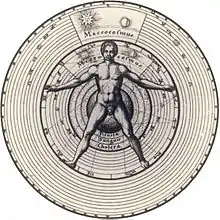宏觀與微觀
宏觀與微觀(Macrocosm and microcosm,或譯為大宇宙與小宇宙)是西方自古希腊、中世纪时代形成的一种观念,假定人类(小宇宙)与宇宙(大宇宙)之间存在结构相似性,因此,关于整个宇宙本质的真理可以从关于人性的真理中推断出来,反之亦然。在世界各地也存在类似的思想,如中国的天人感应、天人相应。

羅伯特·弗拉德(Robert Fludd)把人視為宏觀宇宙中縮影的插圖。弗拉德陳述說“人乃其自己的整體世界,所謂的微觀世界顯示了宇宙所有部分的微型模式。因此頭部是與最高天有關,而胸部是對應著飄渺的天空以及腹部對應基本的實體。(Man is a whole world of its own, called microcosm for it displays a miniature pattern of all the parts of the universe. Thus the head is related to the Empyreal, the chest to the ethereal heaven and the belly to the elementary substance.)”[1]

“藉觀其下,吾知其上。(By looking down, I see up.)”,出自於第谷·布拉赫(Tycho Brahe)的《新天文學儀器》(Astronomiæ instauratæ Mechanica)書中一對插圖的其中之一,描繪了他對宏觀與微觀世界之間的聯繫的理解。

“藉觀其上,吾知其下。(By looking up, I see down.)”
利用这种观念可以推出其他一些观念,包括宇宙可以被视为有生命甚至有灵魂(最早见于柏拉图《蒂迈欧篇》),后影响了斯多噶派。在医学和占星术上,行星也会被认为与人的某个器官或性格间存在关系。
根據學者皮爾·A·李法德(Pierre A. Riffard)所述,它是一個“在所有奧秘思想學派中出現(present in all esoteric schools of thinking)”的特徵。[2]它與赫耳墨斯主義(Hermeticism)密切相關並且基於諸如占星術、煉金術,以及神聖幾何(Sacred geometry)其前提是“如其在上,如其在下(As Above, So Below)”的實踐。[3]
註釋
- Robert Fludd in Utriusque Cosmic Historia, II; quoted by Pierre A. Riffard in , Paris: Payot, 1983, 34.
- Pierre A. Riffard, , Paris: Payot, 1983, 34.
- Antoine Faivre, Access to Western esotericism (页面存档备份,存于), State University of New York Press, 1994, 10-11.
- Republic, Plato, trans. By B. Jowett M.A., Vintage Books, NY. § 435, pg 151
相關條目
參考書目
- Theories of Macrocosms and Microcosms in the History of Philosophy, G. P. Conger, NY, 1922, which includes a survey of critical discussions up to 1922.
外部連結
- Cosmos - an Illustrated Dimensional Journey from microcosmos to macrocosmos-來自於Digital Nature Agency。
This article is issued from Wikipedia. The text is licensed under Creative Commons - Attribution - Sharealike. Additional terms may apply for the media files.